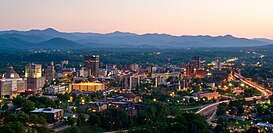Asheville, North Carolina | |
|---|---|
Downtown Asheville | |
| Nickname(s): AVL, Land of the Sky | |
| Motto(s): "Quality of Service, Quality of Life" | |
 Location in Buncombe County and North Carolina | |
| Coordinates: 35°35′44″N 82°33′07″W / 35.59556°N 82.55194°W | |
| Country | United States |
| State | North Carolina |
| County | Buncombe |
| Incorporated | 1797 |
| Named for | Governor Samuel Ashe |
| Government | |
| • Type | Council–manager |
| • Body | Asheville City Council |
| • Mayor | Esther E. Manheimer (D) |
| • Council | Members[1]
|
| Area | |
| • Total | 45.86 sq mi (118.76 km2) |
| • Land | 45.47 sq mi (117.77 km2) |
| • Water | 0.39 sq mi (1.00 km2) 0.85% |
| Elevation | 2,134 ft (650 m) |
| Population (2020) | |
| • Total | 94,589 |
| • Estimate (2023) | 95,056 |
| • Rank | 11th in North Carolina |
| • Density | 2,080.20/sq mi (803.18/km2) |
| • Urban | 285,776 (US: 141st)[3] |
| • Urban density | 1,149.6/sq mi (443.9/km2) |
| • Metro | 417,202 (US: 131st) |
| Demonym | Ashevillan |
| Time zone | UTC−5 (Eastern) |
| • Summer (DST) | UTC−4 (EDT) |
| ZIP Codes | 28801–28806, 28810, 28813–28816 |
| Area code | 828 |
| FIPS code | 37-02140[5] |
| GNIS feature ID | 1018864[6] |
| Website | ashevillenc.gov |
Asheville (/ˈæʃvɪl/ ASH-vil) is a city in and the county seat of Buncombe County, North Carolina, United States.[7] Located at the confluence of the French Broad and Swannanoa rivers, it is the most populous city in Western North Carolina, and the state's 11th-most-populous city. According to the 2020 census, the city's population was 94,589,[8] up from 83,393 in the 2010 census.[9] It is the principal city in the three-county Asheville metropolitan area, which had an estimated population of 417,202 in 2023.[10][4]
- ^ "Meet City Council". www.ashevillenc.gov. August 8, 2023. Retrieved February 27, 2024.
- ^ "ArcGIS REST Services Directory". United States Census Bureau. Archived from the original on January 19, 2022. Retrieved September 20, 2022.
- ^ United States Census Bureau (December 29, 2022). "2020 Census Qualifying Urban Areas and Final Criteria Clarifications". Federal Register. Archived from the original on December 30, 2022. Retrieved January 2, 2023.
- ^ a b "Metropolitan and Micropolitan Statistical Areas Population Totals: 2020-2023". United States Census Bureau, Population Division. March 14, 2024. Retrieved March 15, 2024.
- ^ "U.S. Census website". United States Census Bureau. Archived from the original on December 27, 1996. Retrieved January 31, 2008.
- ^ "GNIS Feature Search". United States Geological Survey. June 17, 1980. Archived from the original on November 20, 2020. Retrieved January 6, 2015.
- ^ "NACo County Explorer". National Association of Counties. March 30, 2020. Archived from the original on December 27, 2020. Retrieved 26 December 2020.
- ^ Cite error: The named reference
2020CensusQuickFactswas invoked but never defined (see the help page). - ^ "Annual Estimates of the Resident Population for Incorporated Places in North Carolina: April 1, 2010 to July 1, 2019". City and Town Population Totals: 2010-2019 (Excel (XLSX)). United States Census Bureau. May 13, 2020. Asheville city, North Carolina. Archived from the original on January 11, 2021. Retrieved December 28, 2020.
- ^ "OMB Bulletin No. 23-01: Revised Delineations of Metropolitan Statistical Areas, Micropolitan Statistical Areas, and Combined Statistical Areas, and Guidance on Uses of the Delineations of These Areas" (PDF). United States Office of Management and Budget. July 21, 2023. Archived (PDF) from the original on July 21, 2023. Retrieved August 10, 2023.






